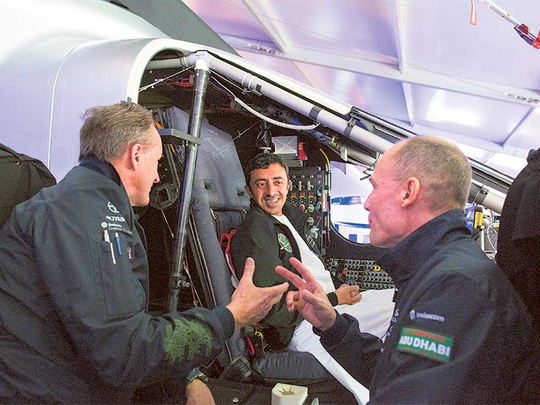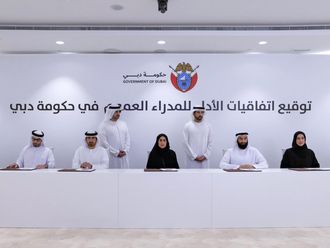
Abu Dhabi: Pilots of the first solar flight on a global trip are not concerned about their safety in the wake of last year’s terrible plane crashes. They have a more urgent concern. “I am more afraid to live in a world that is burning a million tonnes of fossil fuel every hour which is destroying our planet,” Bertrand Picaard, one of the pilots of Solar Impulse-2 (Si2) that will soon take off from Abu Dhabi, said at an event in the capital yesterday.
The innovative technologies of the Si2, on the other hand, can be used to improve many aspects of people’s lives, apart from demonstrating the potential and benefits of clean energy, he said, while unveiling the flight’s global route.
Piccard and André Borschberg, Swiss co-founders and pilots of Solar Impulse, along with their partners, revealed that Si-2 would fly day and night, and land in 12 locations across the world. It will travel 35,000 kilometres in the first attempt to fly around the globe without using a drop of fuel.
Si2 will take-off from Abu Dhabi in late February or early March and return by late July or early August. The route includes stopovers in Muscat in Oman; Ahmedabad and Varanasi in India, Mandalay in Myanmar, Chongqing and Nanjing in China. After crossing the Pacific Ocean via Hawaii, Si2 will fly across the Continental US stopping over in three locations — Phoenix and New York City at JFK. A location in the Midwest will be decided depending on weather conditions.
After crossing the Atlantic, the final leg includes a stop-over in southern Europe or North Africa before returning to Abu Dhabi.
Answering reporters’ questions, Piccard said although a commercial solar fight is a remote possibility, a four- or five-seater flight for short trips may be a possibility in the near future. Si2 aims to raise awareness about the potential of clean energy.
About the innovative technologies of Si2 to improve people’s lives, he said the technology used for building the cockpit can triple the capacity of refrigerators. Lighting of the flight is the most energy efficient in its technology, Piccard explained.
Solar Impulse’s host partner Masdar, Abu Dhabi’s renewable energy company, hosted the event at Al Bateen Executive Airport where the Si-2 was on display. The aircraft was transported from Switzerland by Masdar.
The first round-the-world solar adventure will span approximately 25 flight days, spread over five months, covering approximately 35,000 kilometres at speeds between 50km/h and 100 km/h.
Shaikh Abdullah Bin Zayed Al Nahyan, Foreign Minister, inspected the Solar Impulse 2 aircraft prior to its take-off. Shaikh Abdullah was briefed on the specifications and capabilities of the aircraft. He wished the plane’s crew success and a safe return. “The fact that the plane was assembled in the UAE and will take off from Abu Dhabi in March represents a significant step for this aircraft’s historic trip around the world. Abu Dhabi being chosen as the departure and return point reaffirms the UAE’s leading position in the renewable energy sector, and its development on the regional and global scale.
Dr Sultan Ahmad Al Jaber, UAE Minister of State and Chairman of Masdar. said: “Masdar and the emirate of Abu Dhabi are proud to host the departure, and, hopefully, safe arrival of Solar Impulse and its pilots, as they dare to fly round the world using only the power of the sun.”
“It is a demonstration to prove the impossible can be possible, and that innovation knows no boundaries. As a leader delivering sophisticated renewable energy projects around the world, Masdar is a natural partner for such an innovative endeavour, which underscores the viability of solar technology,” Al Jaber said.












